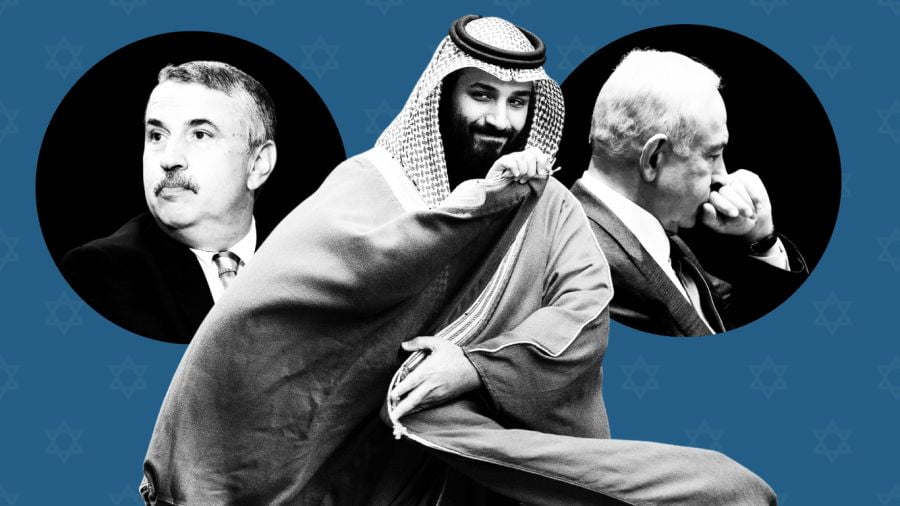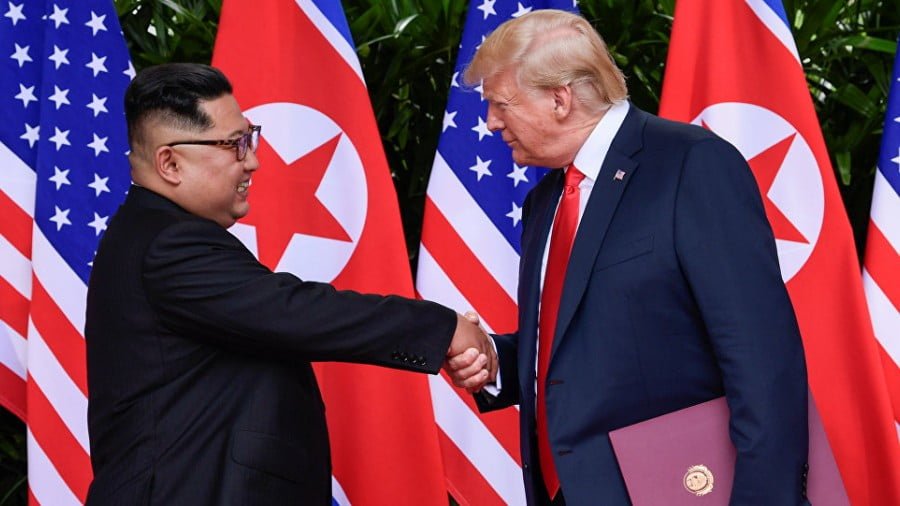The Controversial US-Saudi-Israel Alliance: Friedman’s Folly and Netanyahu’s Dilemma
The Israeli press is abuzz following a “New York Times” piece by Thomas Friedman in which he discusses U.S. President Joe Biden’s attempt at forging a strategic U.S.-Saudi alliance, including a crucial normalization clause with Israel.
Recently, President Biden granted an interview to Friedman, during which this strategic alliance was a topic of discussion. As per Friedman, a delegation led by Secretary of State Anthony Blinken is currently in Riyadh, engaged in efforts to establish this alliance.
Biden has given the go-ahead for his team to explore the possibilities with Crown Prince Mohammed bin Salman of Saudi Arabia, seeking to determine the feasibility and terms of such a deal. As Friedman puts it, Biden “gave a green light for his team to probe with Crown Prince Mohammed bin Salman of Saudi Arabia to see if some kind of deal is possible and at what price.”
The Issue(s) with Thomas Friedman
The issue with Thomas Friedman extends beyond his patronizing tone towards anyone other than Israelis and Americans; it lies in his depiction of a world that seemingly exists solely within the confines of Washington, DC.
In his piece, Friedman writes:
A U.S.-Saudi security pact that produces normalization of relations between Saudi Arabia and the Jewish state — while curtailing Saudi-China relations — would be a game changer for the Middle East, bigger than the Camp David peace treaty between Egypt and Israel.”
What Friedman overlooks is that the absence of peace and stability in the Middle East is not an enigma; it is a consequence of Israel’s apartheid policies. Moreover, the so-called peace between Israel and Egypt is widely regarded as a compromised pact between a traitorous Egyptian President, Anwar Sadat – who paid with his life for this agreement – and the occupying forces of Palestine, commonly known as Israel.
However, Friedman thinks this strategic alliance – which would provide more weapons and nuclear energy to a dictatorship that chops up dissenters – would be an achievement. It means throwing the Palestinians under the bus for good, and, to Friedman, this is good because “peace between Israel and Saudi Arabia, the custodian of Islam’s two holiest cities, Mecca and Medina, would open the way for peace between Israel and the whole Muslim world, including giant countries like Indonesia and maybe even Pakistan. It would be a significant Biden foreign policy legacy.”
Now here is where Friedman really gets it wrong, either out of ignorant or because he is out of touch. He writes,
If the U.S. forges a security alliance with Saudi Arabia — on the conditions that it normalizes relations with Israel and that Israel makes meaningful concessions to the Palestinians — Netanyahu’s ruling coalition of Jewish supremacists and religious extremists would have to answer this question: You can annex the West Bank, or you can have peace with Saudi Arabia and the whole Muslim world, but you can’t have both, so which will it be?”
Asked and answered, counselor! Consecutive Israeli governments and Israeli society have had this conversation many times, not the least of which was after the Saudis presented their peace plan at the Arab League summit in Beirut in 2002.
Israel does not want peace unless it is on its own terms. That means Palestinians get nothing, Arabs get nothing, Muslims get nothing, and Christians get spat on.
Still, he goes on,
I’d love to see Israel’s far-right finance minister, Bezalel Smotrich, go on Israeli television and explain to the Israeli people why it is in Israel’s interest to annex the West Bank and its 2.9 million Palestinian inhabitants — forever — rather than normalize ties with Saudi Arabia and the rest of the Muslim world.”
First of all, there are 3.5 million Palestinians in the West Bank, not 2.9 million. And as for Smotrich, if Friedman had been paying attention, he would know that Smotrich and the entire Netanyahu cabinet are little more a messianic hate group.
The members of the Israeli government don’t care about peace or Arab or Muslim countries. They want to see one thing: Palestinians dying or leaving, and to this end, they are doing everything they can. Appeasing Biden’s ambitions for a foreign policy victory is of no interest to them.
Friedman’s Folly
Here is how Friedman explains what the Saudis will want and how they view the Palestinian issue:
The Saudis would demand of Israel to preserve the prospect of a two-state solution — the way the United Arab Emirates demanded that Netanyahu forgo any annexation of the West Bank as a price for their Abraham Accords.”
Upon closer examination, the phrase “preserve the prospect of a two-state solution” is either an unrealistic or intentionally misleading statement. Such a claim can only be made by someone who is either uninformed, disingenuous or completely disconnected from the reality on the ground. The truth is, there has never been a genuine prospect of a two-state solution. The Zionist entity has historically opposed the establishment of a Palestinian state, and today, Israel’s Nation-State law explicitly grants the right to self-determination solely to Jews in Palestine.
Then the “expert” Friedman explains, “The Saudi leadership is not particularly interested in the Palestinians or knowledgeable about the intricacies of the peace process.” Aha! Never mind the part where the Saudis are not interested in the Palestinians for now but to claim that they are not “knowledgeable about the intricacies of the peace process.” Where does anyone have the conceit to write such absolute garbage? The only serious and well-thought-out peace plan that was ever presented was the Saudi Peace Plan of 2002.
An excerpt from the Saudi plan reveals the Saudis’ profound understanding of the intricacies while simultaneously exposing Israel’s myopic stance. This is what Israel declined:
Calling for full Israeli withdrawal from all the Arab territories occupied since June 1967, in implementation of Security Council Resolutions 242 and 338, reaffirmed by the Madrid Conference of 1991 and the land-for-peace principle, and Israel’s acceptance of an independent Palestinian state with East Jerusalem as its capital, in return for the establishment of normal relations in the context of a comprehensive peace with Israel.
This comprehensive proposal showcases the Saudis’ astuteness in grasping the complexities of the situation while underscoring the unfortunate refusal of Israel to embrace a path toward genuine peace and lasting stability.
Israel had no substantive response to this deal. On April 21, 2009, Israeli Foreign Minister and Deputy Prime Minister Avigdor Lieberman dismissed the plan as “a dangerous proposal, a recipe for the destruction of Israel.” Likewise, Prime Minister Netanyahu categorically declared that Israel would never accept the Arab Peace Initiative.
Netanyahu’s future
Thomas Friedman ends his piece by saying that if this “would force Netanyahu to abandon the extremists in his cabinet and make common cause with the Israeli center left and center right, well, wouldn’t that just be the cherry on top?” A cherry on top, well, isn’t that just so cute?
Clearly lacking the most basic idea of the realities of Israeli politics, Friedman doesn’t understand that there are two important reasons why Netanyahu will never abandon the extremists in his cabinet. The first reason is that he agrees with them ideologically. They are the foot soldiers that turn his ideology into practice. The is that he needs them to stay in power and out of jail.
Feature photo | Illustration by MintPress News







